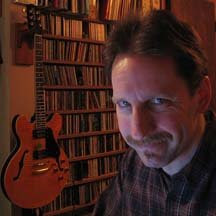Just work the key signature in the correct major or minor pentatonic scale and you'll sound like a rockin' guy. Don't play minor pentatonics over major key chord progressions. Don't play the relative major over minor progressions.
To which he replied:
I already know pentatonics, guys. I just remember sitting in an audience at watching a guy noodle through pentatonics and thinking "damn, he's ruining the song"To which I replied:
He was probably playing the wrong pentatonic scale.A lot of guys focus on the minor pentatonic, because its a close relative of the blues scale. That's more or less okay for a I-IV-V blues progression, but if the chord progression is more advanced, then there's going to be problems.
For instance, an A minor pentatonic will be a disaster on an A major progression. For an A major progression, you can just drop to an F# minor pentatonic, which is more closely related to an A major scale.
As you get more into the chord progressions of the songs, you can start incorporating pentatonic scales based on the root of the relative Dorian or Mixolydian modes. For instance, a C minor progression can be approached with a D minor pentatonic or G minor pentatonic.
